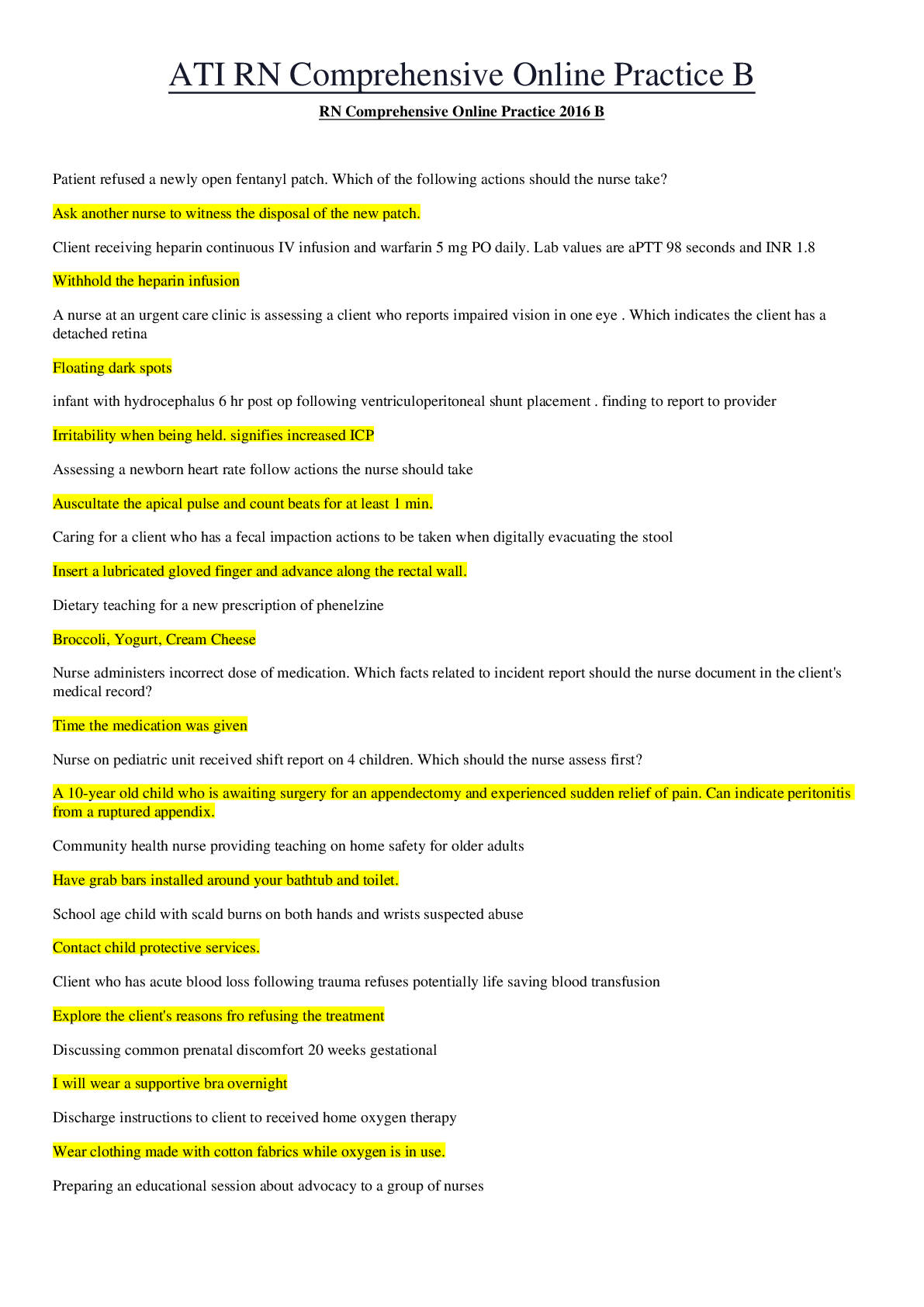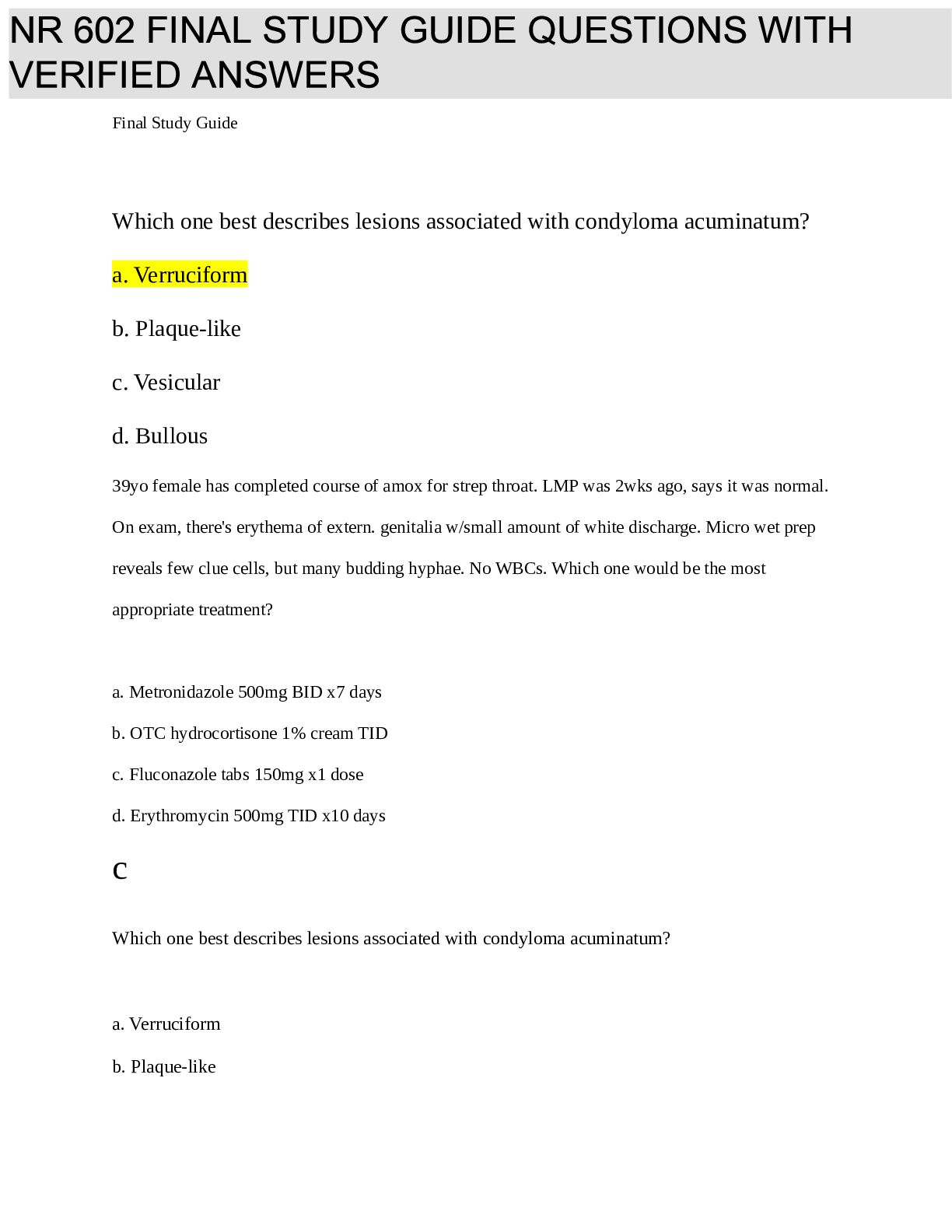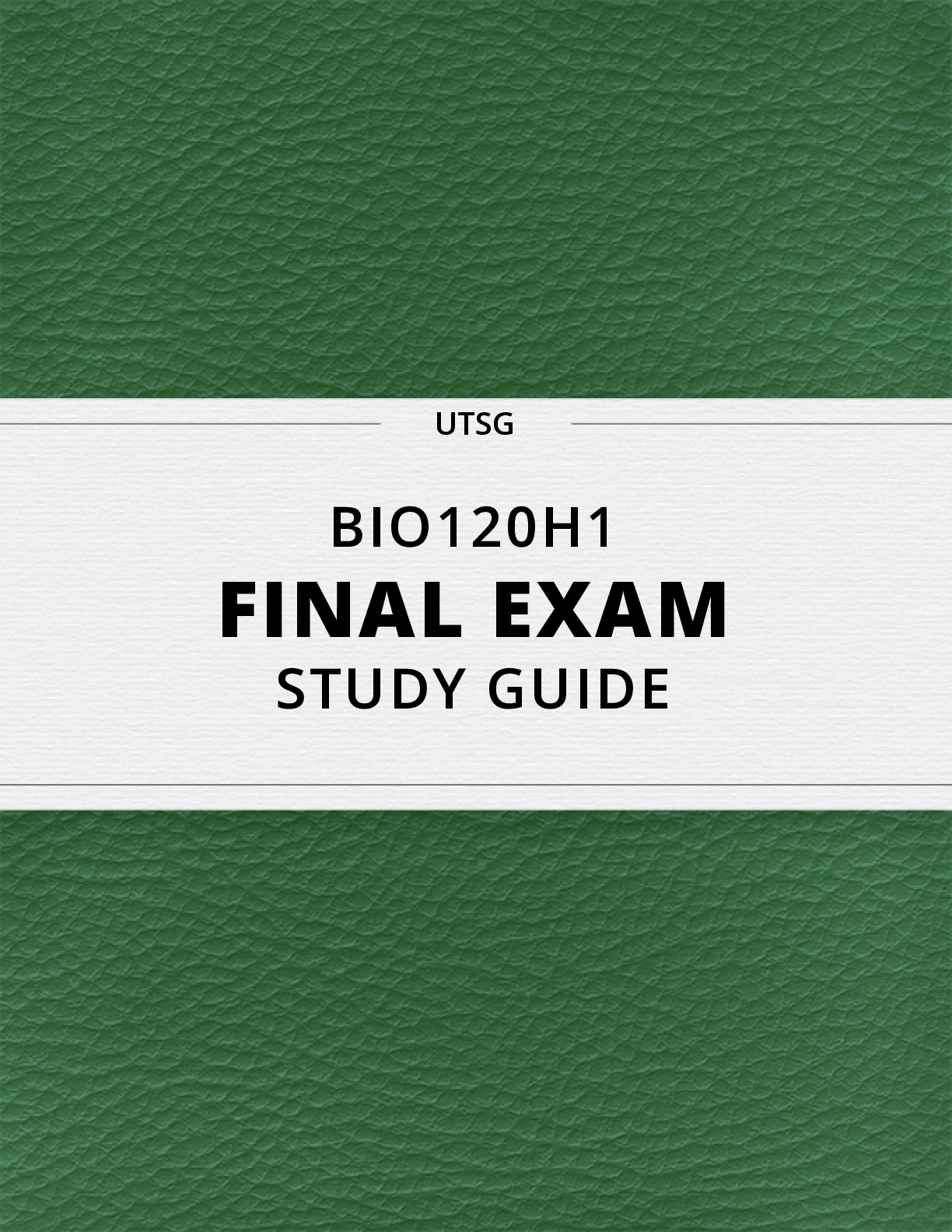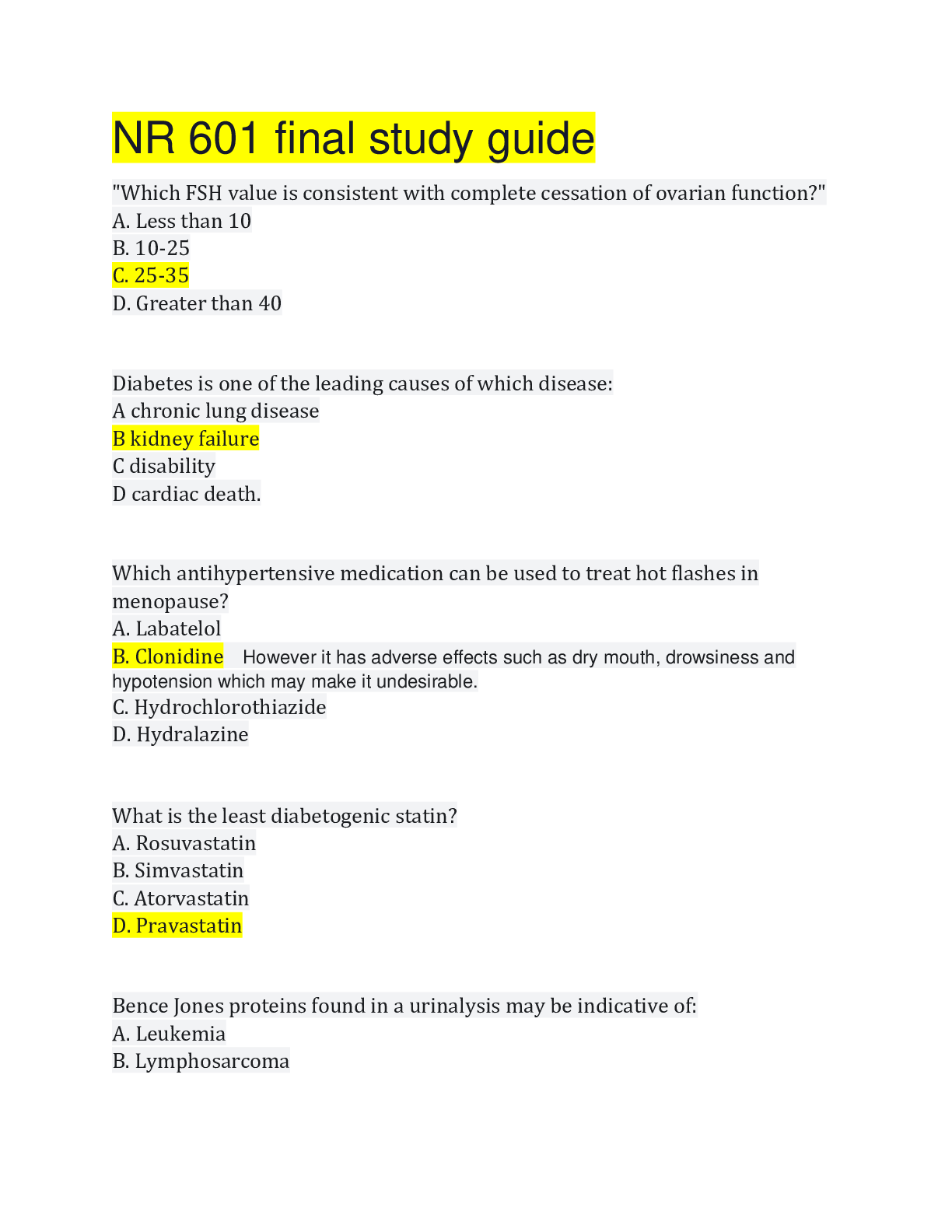Biology > EXAM > UPNS 480W Final study guide Complete (latest) – Duquesne University | UPNS480W Final study guide C (All)
UPNS 480W Final study guide Complete (latest) – Duquesne University | UPNS480W Final study guide Complete – Duquesne University
Document Content and Description Below
UPNS 480W Final study guide Complete – Duquesne University 55 Multiple-choice questions Points Awarded 49.00 Points Missed 1.00 Percentage 98.0% 1. Biological agents such as bacteri... a and viruses differ from other injurious agents in terms of their ability to: A) affect tissues throughout the body B) cause cell death C) replicate and produce continued injury D) produce reversible cell injury Table for Individual Question Feedback Points Earned: 1.0/1.0 Correct Answer(s): C 2. What is apoptosis? A) A normal mechanism for cells to self-destruct when growth is excessive B) An antigrowth signal activated by tumor suppressor Rb C) A mutation of cell growth stimulated by the p53 gene D) The transformation of cells from dysplasia to anaplasia Table for Individual Question Feedback Points Earned: 1.0/1.0 Correct Answer(s): A 3. What is a consequence of leakage of lysosomal enzymes during chemical injury? A) Enzymatic digestion of the nucleus and nucleolus occurs halting DNA synthesis. B) Influx of potassium ions into the mitochondria occurs halting the ATP production. C) Edema of the Golgi body occurs preventing the transport of proteins out of the cell. D) Shift of calcium out of the plasma membrane occurs destroying the cytoskeleton. Table for Individual Question Feedback Points Earned: 1.0/1.0 Correct Answer(s): A 4. The abnormal proliferation of cells in response to excessive hormonal stimulation is called: A) dysplasia. B) pathologic dysplasia. C) hyperplasia. D) pathologic hyperplasia. Table for Individual Question Feedback Points Earned: 1.0/1.0 Correct Answer(s): D 5. Which cell component is capable of cellular autodigestion when it is released during cell injury? A) Ribosome B) Golgi complex C) Smooth endoplasmic reticulum D) Lysosomes Table for Individual Question Feedback Points Earned: 1.0/1.0 Correct Answer(s): D 6. Which type of cell adaptation occurs when normal columnar ciliated epithelial cells of the bronchial lining have been replaced by stratified squamous epithelial cells? A) Hyperplasia B) Metaplasia C) Dysplasia D) Anaplasia Table for Individual Question Feedback Points Earned: 1.0/1.0 Correct Answer(s): B 7. During ischemia, what effect does the loss of adenosine triphosphate (ATP) level have on cells? A) Cells shrink because of the influx of calcium (Ca). B) Cells shrink because of the influx of potassium chloride (KCl). C) Cells swell because of the influx of sodium chloride (NaCl). D) Cells swell because of the influx of nitric oxide (NO). Table for Individual Question Feedback Points Earned: 1.0/1.0 Correct Answer(s): C 8. What type of necrosis results from ischemia of neurons and glial cells? A) Coagulative necrosis B) Liquefactive necrosis C) Caseous necrosis D) Gangrene necrosis Table for Individual Question Feedback Points Earned: 1.0/1.0 Correct Answer(s): B 9. The mammary glands enlarge during pregnancy primarily as a consequence of: A) compensatory hyperplasia. B) hormonal hyperplasia. C) hormonal anaplasia. D) hormonal dysplasia. Table for Individual Question Feedback Points Earned: 1.0/1.0 Correct Answer(s): B 10. Hydropic swelling is a sign of cellular injury associated with: A) necrosis B) Na+K+ pump dysfunction C) apoptosis D) aging Table for Individual Question Feedback Points Earned: 1.0/1.0 Correct Answer(s): B 11. How are potassium and sodium transported across plasma membranes? A) By passive electrolyte channels B) By coupled channels C) By adenosine triphosphate enzyme (ATPase) D) By diffusion Table for Individual Question Feedback Points Earned: 1.0/1.0 Correct Answer(s): C 12. Cells differ in structure and function because they: A) all have different DNA and genes B) selectively express certain genes that give them their character C) selectively eliminate certain genes from the genome during development D) undergo selective mutations over time Table for Individual Question Feedback Points Earned: 1.0/1.0 Correct Answer(s): B 13. Which clinical manifestations would be expected for a child who has complete trisomy of the twenty-first chromosome? A) Widely spaced nipples, reduced carrying angle at the elbow, and sparse body hair B) An IQ of 25 to 70, low nasal bridge, protruding tongue, and flat, low-set ears C) High-pitched voice, tall stature, gynecomastia, and an IQ of 60 to 90 D) Circumoral cyanosis, edema of the feet, short stature, and mental slowness Table for Individual Question Feedback Points Earned: 1.0/1.0 Correct Answer(s): B 14. What is transcription? A) It is the process by which DNA polymerase binds to the promoter site on RNA. B) It is the process by which RNA directs the synthesis of polypeptides for protein synthesis. C) It is the process by which RNA is synthesized from a DNA template. D) It is the process of a mutation of the amino acid sequence by a base pair substitution. Table for Individual Question Feedback Points Earned: 1.0/1.0 Correct Answer(s): C - - - - - - - - - - - - - - - - - - - - - - - - - - - - 42. _____ involves an abnormally enlarged gas-exchanged system and the destruction of alveolar walls. A) Transudative effusion B) Abscess C) Emphysema D) Exudative effusion Table for Individual Question Feedback Points Earned: 1.0/1.0 Correct Answer(s): C 43. Which of the following hepatitis viruses has been linked to blood transfusions received by persons before 1992 and as yet has no vaccine available to prevent its occurrence? A) Hepatitis D B) Hepatitis B C) Hepatitis A D) Hepatitis C Table for Individual Question Feedback Points Earned: 1.0/1.0 Correct Answer(s): D 44. The kidney disorder characterized by hypoalbuminemia, edema, hyperlipidemia and lipiduria is A) pyelonephritis. B) chronic glomerulonephritis. C) nephrotic syndrome. D) acute glomerulonephritis. Table for Individual Question Feedback Points Earned: 1.0/1.0 Correct Answer(s): C 45. Which of the following is manufactured by the liver and primarily contains cholesterol and protein? A) Triglycerides (TGs) B) High-density lipoproteins (HDLs) C) Very-low-density lipoproteins (VLDLs) D) Low-density lipoproteins (LDLs) Table for Individual Question Feedback Points Earned: 1.0/1.0 Correct Answer(s): D 46. Which statements are true regarding fatty streaks? (Select all that apply.) A) Fatty streaks are formed by killer T cells filled with oxidized LDLs B) Fatty streaks are capable of producing toxic oxygen radicals C) When present, inflammatory changes occur to the vessel walls D) Fatty streaks progressivley damage vessel walls Table for Individual Question Feedback Points Earned: 1.0/1.0 Correct Answer(s): D, B, C 47. After a partial gastrectomy or pyloroplasty, clinical manifestations that include increased pulse, hypotension, weakness, pallor, sweating, and dizziness are a result of: A) an anaphylactic reaction in which chemical mediators, such as histamine, prostaglandins, and leukotrienes, relax vascular smooth muscles causing shock. B) a concentrated bolus that moves from the stomach into the small intestine, which causes hyperglycemia, resulting in polyuria and eventually hypovolemic shock. C) a rapid gastric emptying and creation of a high osmotic gradient in the small intestine that causes a sudden shift of fluid. D) hemorrhage postoperatively in which a large volume of blood is lost, causing hypotension with compensatory tachycardia. Table for Individual Question Feedback Points Earned: 1.0/1.0 Correct Answer(s): C 48. What leads to the kidney damage associated with chronic pyelonephritis? A) Hydronephrosis B) Increased renal calculi C) Increased urine stasis D) Inflammation leading to scarring Table for Individual Question Feedback Points Earned: 1.0/1.0 Correct Answer(s): D 49. Hepatitis sometimes has an insidious onset because the signs and symptoms are vague and resemble the flu. What is this phase of the clinical course of hepatitis called? A) Recovery phase B) Prodomal phase C) Posticteric phase D) Icteric phase Table for Individual Question Feedback Points Earned: 1.0/1.0 Correct Answer(s): B 50. Anemia of chronic kidney disease can be successfully treated with A) intrinsic factor. B) erythropoietin. C) vitamin B12. D) Vitamin D Table for Individual Question Feedback Points Earned: 1.0/1.0 Correct Answer(s): B 51. What part of the kidney controls renal blood flow, glomerular filtration, and renin secretion? A) Filtration slits B) Macula densa C) Visceral epithelium D) Juxtaglomerular apparatus Table for Individual Question Feedback Points Earned: 1.0/1.0 Correct Answer(s): D 52. What clinical manifestations would be evident in left sided heart failure only? A) Hepatomegaly B) Peripheral edema C) Pulmonary edema D) Ankle swelling Table for Individual Question Feedback Points Earned: 1.0/1.0 Correct Answer(s): C 53. The development of esophageal varices is serious because of what potential complication? A) Malignant hypertension B) Massive hemorrhage C) Ascites D) Obstruction of the esophagus Table for Individual Question Feedback Points Earned: 1.0/1.0 Correct Answer(s): B 54. The process of conjugation of bilirubin in the liver is best described as the transformation of A) unconjugated (fat-soluble) bilirubin into conjugated (water-soluble) bilirubin. B) unconjugated (fat-soluble) bilirubin into urobilinogen. C) conjugated (water-soluble) bilirubin into urobilinogen. D) conjugated (water-soluble) bilirubin into unconjugated (fat-soluble) bilirubin. Table for Individual Question Feedback Points Earned: 1.0/1.0 Correct Answer(s): A 55. The most common cause of heart failure is: A) coronary heart disease B) hypertrophic cardiomyopathy C) hypotension D) valvular dysfunction Table for Individual Question Feedback Points Earned: 1.0/1.0 Correct Answer(s): A [Show More]
Last updated: 2 years ago
Preview 1 out of 104 pages

Buy this document to get the full access instantly
Instant Download Access after purchase
Buy NowInstant download
We Accept:

Reviews( 0 )
$20.50
Can't find what you want? Try our AI powered Search
Document information
Connected school, study & course
About the document
Uploaded On
Jun 23, 2020
Number of pages
104
Written in
Additional information
This document has been written for:
Uploaded
Jun 23, 2020
Downloads
0
Views
70








 – University of the People.png)









 – San Antonio College.png)






